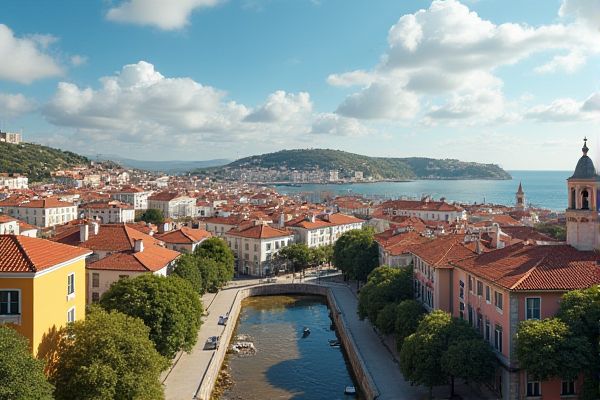
Emergency services and contact information in Portugal: Emergency services number: 112. Police contact: PSP or GNR. Fire department: Bombeiros. Ambulance service: INEM. Poison control center contact. Nearest hospital location. English-speaking assistance availability. Local pharmacy hours and contact. Blood donation centers. Weather alerts and warnings system.
Emergency services number: 112
In Portugal, the universal emergency services number is **112**, available 24/7 and free of charge, which connects callers to police, fire brigade, medical services, and other emergency responders. This number is the primary contact for all types of emergency situations, and it is crucial to use it only for genuine emergencies to avoid overloading the system. For more detailed information, you can visit the comprehensive guide on Emergency Numbers in Portugal. Being aware of these numbers and using them responsibly is vital for ensuring swift assistance during critical times.
Police contact: PSP or GNR
In Portugal, for police contact, you can reach the Public Security Police (PSP) for urban areas and the National Republican Guard (GNR) for rural areas. The universal emergency number is 112, but specific contact numbers for PSP and GNR vary by region and can be found on their respective websites. For a comprehensive guide and more information, you can visit Hey Portugal. This resource provides valuable insights on how to contact the relevant authorities and ensure your safety while staying informed about local procedures.
Fire department: Bombeiros
In Portugal, if you encounter a fire emergency, including forest fires, it's essential to call the emergency number 112. For forest fire situations specifically, you can contact 117. The Portuguese fire service, commonly referred to as Bombeiros, is composed of both professional and volunteer firefighters, playing a crucial role in safeguarding the country. With a dedicated team of professionals and a large contingent of volunteers, Bombeiros ensure efficient and timely responses to emergencies. To learn more about emergency numbers in Portugal, you can visit the comprehensive guide provided by Expatica, a valuable resource for residents and travelers.
Ambulance service: INEM
The National Institute of Medical Emergency (INEM) in Portugal is responsible for providing emergency medical care, including on-the-scene care, transport to hospitals, and coordination between healthcare facilities. For comprehensive information about their services and structure, you can visit the website. You can contact INEM by dialing the European emergency number 112, which is available 24/7.
Poison control center contact
In Portugal, for poison control, you can call the INEM Poison Information Center (CIAV) at 800 250 250, a 24/7 free service operated by specialized medical personnel. This dedicated line is crucial for seeking immediate advice in cases of poisoning, ensuring that individuals have access to expert guidance at any time. For more details on the services provided by the center, visit the Siam IT website, which offers additional insights into the importance of this vital helpline. By simplifying access to professional assistance, the center plays a pivotal role in health emergencies, reaffirming its commitment to public safety and health.
Nearest hospital location
To find the nearest hospital in Portugal, you can call the emergency number 112 or visit the Portuguese Healthcare Service (SNS) website, which provides lists of hospitals, doctors, and pharmacies in your area. This resource allows you to select the service you require and your district to obtain contact details for your nearest healthcare specialist.
English-speaking assistance availability
In Portugal, the 112 European Emergency Call Centre provides English-speaking assistance, among other languages, and is available 24/7 for all types of emergency situations, including medical, fire, and police emergencies.
Local pharmacy hours and contact
In Portugal, pharmacies typically operate from Monday to Friday between 9 AM and 7 PM, and on Saturdays from 9 AM to 1 PM. However, some pharmacies provide round-the-clock service, with a select number open 24 hours a day. Additionally, certain pharmacies take turns opening on Sundays to ensure accessibility when needed. For those interested in learning more about the emergency services available, refer to the detailed information on Emergency Numbers in Portugal which outlines important contacts for any urgent situations.
Blood donation centers
The Portuguese Institute of Blood and Transplantation (IPST, IP) plays a crucial role in managing blood donation in Portugal, overseeing the collection, processing, storage, and distribution of blood and its components. Remarkably, IPST, IP is responsible for handling approximately 60% of the country's blood collection, while the remaining portion is managed by hospital blood establishments. For further details, you can reach out to IPST, IP at Avenida Miguel Bombarda, 6, 1000-208 Lisboa, Portugal. For more comprehensive information on blood management in Portugal, visit the European Blood Alliance website.
Weather alerts and warnings system
In Portugal, the National Authority for Emergency and Civil Protection (ANEPC) operates a comprehensive weather alerts and warnings system, utilizing the "MAI Mobile" app, press releases, and an SMS warning system to inform citizens of extreme risk situations. This includes forest fires, extreme weather, and other emergencies, with messages sent in Portuguese and English to affected areas. For more information on their initiatives, you can visit the National Disaster Management System website.
